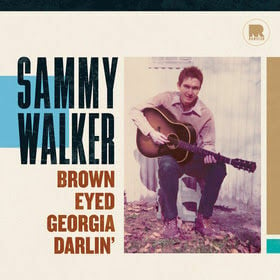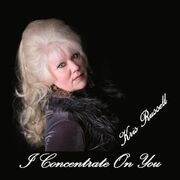New York, NY (Top40 Charts) For a guy whose musical moment rose and fell about as fast as a cloudburst, the story of folk singer-songwriter Sammy Walker's career carries more twists than a tornado. The latest comes in the form of a April 8, 2016 Ramseur Records release titled Brown Eyed Georgia Darlin'.
One could call this vinyl LP and CD combo package a follow-up to his 2008 Ramseur album,
Misfit Scarecrow - except that it predates that material by more than three decades. Recorded in the mid-1970s at New York's famed Record Plant, Brown Eyed Georgia Darlin' contains the previously unreleased demos that earned Walker a contract with Warner Bros. Records. How he got there - and from there to here - is one of those crazy music-biz tales that makes you wonder whether to laugh or cry. The best approach, it turns out, is to take a cue from his songs. The humor and heartache they contain are as real as it gets.
And if the true test of a folk talent is the ability to write topical songs that somehow sound timeless - and, for better or worse, remain uncannily relevant decades after their birth - Walker scores a perfect 100.
Now this day and time it's almost come to be a crime to be old in this here country/feeding on decrepit health to fatten up the purse of wealth. God knows it.
Walker wrote that at 23 after reading a newspaper story; his lines convey every shiver, every ounce of despair his sad subject endured, magnified against the celebratory excess of a football-crazy city on game day. It's the epitome of a folk song, raising awareness about an injustice while contextualizing it as a compelling narrative.
But back to Walker's story: A Georgia native now living in North Carolina, he recorded two albums in the 1970s for Moe Asch's Folkways Records (now Smithsonian Folkways), and two more for Warner Bros. Renowned folkie Phil Ochs, who produced Walker's first, 1975's Broadside Ballads, Vol. 8: Song for Patty, championed his Dylan-meets-Arlo-and-Woody voice and formidable songsmithing skills to Warner head Mo Ostin even before the album's release. After hearing these demos - during the Springsteen/Buckley/Wainwright/Prine era when every label was on the hunt for the next "new Dylan" - Ostin snapped him up.
"Phil liked to say, 'This guy's better than Dylan.' Of course, there ain't nobody better than Dylan," Walker says, "but Phil heard something he was impressed with. I think he saw in me more of himself than he did [in] Bob Dylan."
Though you might swear it's Dylan - or Arlo - singing "Talkin' Women's Lib," it's worth noting that the talking-blues style predated both.
"Of course, I idolized Dylan when I was a teenager and that led me to Woody and Ochs and Tom Paxton and all those people," Walker says. "But the way I played and sang wasn't an imitation, it was just the way I sounded."
Walker started playing guitar at 13 and began writing songs a few years later. His first performance occurred at the Last Resort, a folk club in Athens, Ga.
"On the weekends they'd have people like Steve Goodman and Townes Van Zandt, and on the weekdays, they'd hire somebody like me and pass the hat," he recalls. "The first time I ever played, I got about $18 and I thought, 'Lord, people are paying me to get onstage and caterwaul.' It just kind of went from there."
An apartment-building janitor by day, Walker was content to perform in Georgia clubs at night. But then the building changed hands and the staff was fired. With no backup plan, he decided to send a homemade tape to Broadside magazine, the influential folk publication that often printed worthy lyrics. He says he didn't expect a response, and didn't get one - for a while.
When he did, it was huge. The magazine not only published his lyrics, but co-founder
Gordon Friesen also sent the tape to influential New York DJ Bob Fass, creator of WBAI radio's popular overnight show, "Radio Unnameable." Fass, considered a father of free-form radio, started playi
ng Walker nightly, then invited him to come on the show. So Walker got on a train and headed north.
The day after he went on the air, the Weavers' Lee Hays and Ochs both requested meetings. He met Ochs at the Broadside office, where he performed just a few songs before Ochs committed to helping Walker connect with Folkways. "He went to Moe Asch and talked him into making a record with me," Walker says in his typically self-deprecating manner.
Walker, who admits in the Georgia Darlin' liner notes that the only musical ambition he ever harbored was to make a Folkways record, still sounds surprised that it happened, much less what followed. While Ochs pushed Walker to Warner, Harold Leventhal caught wind of his talents. The legendary manager of Woody and
Arlo Guthrie and the Weavers was hunting for someone to play Woody in the film version of Bound for Glory. Hays suggested Walker. Broadside co-founder Sis Cunningham accompanied him to her pal Leventhal's office and harmonized as Walker sang Guthrie.
"Harold got real excited and wanted to send me out to Hollywood for a screen test, but the director, Hal Ashby, said he wasn't gonna work with no unknown," reports Walker. (The part went to
David Carradine.) But Leventhal became his manager and negotiated Walker's Warner contract, on the strength of these mostly one-take demos. Nik Venet produced his self-titled Warner debut, released in 1976 (and featuring stellar backing by
James Burton and Jim Gordon, among others). Los Angeles Times critic Robert Hilburn declared it one of the year's most noteworthy debuts.
Sadly, label-limbo realities set in before Walker recorded its 1977 follow-up, Blue Ridge Mountain Skyline. With disco and new wave on the rise, Warner did little to promote either one, and, the artist says, as much as he liked Leventhal, a younger, hungrier manager might have pushed harder for him. Walker lacked even a booking agent, though he did score a European tour in '78.
When he got home, he learned Warner had dropped him. He tried to find another home, but even smaller labels wouldn't sign someone who didn't move units on a major label.
Walker did Songs From Woody's Pen, an album of Guthrie covers, for Folkways in 1979, a year after he moved to the Catskills town of Stamford. And that seemed to be it. "It just kind of all fell apart before it really got off the ground for me," he sighs. "I couldn't even make a living. I had to take a job at a convenience store."
He spent 17 years behind that counter, performing only when someone requested his presence. During a 1985 appearance, he got an offer to tour Italy, and did 18 Italian and Austrian dates. When he returned three years later, someone recorded the show that became Sammy Walker in Concert, released in 1990 by
Swiss label Brambus Records. Walker, who never stopped writing, released a second Brambus recording, Old Time Southern Dream, in 1994.
In 1996, Walker and his wife moved to North Carolina to care for his mother. Three years later, Dolph Ramseur called. "He said he knew my music and he asked me to play at his 30th birthday party. And we became friends."
<
Ramseur wasn't yet involved in the music business, but was interested in breaking in, and asked if Walker had any music nobody had heard. He got the demo tapes.
A year later, Ramseur Records was born - and rapidly built success with the
Avett Brothers and other artists.
Misfit Scarecrow followed. And now, a year after Walker started collecting Social Security, comes the release that should have launched a bigger career.
Arthritis has ended his playing days, but the music lives - and with Brown Eyed Georgia Darlin', Sammy Walker is about to be discovered all over again.
























